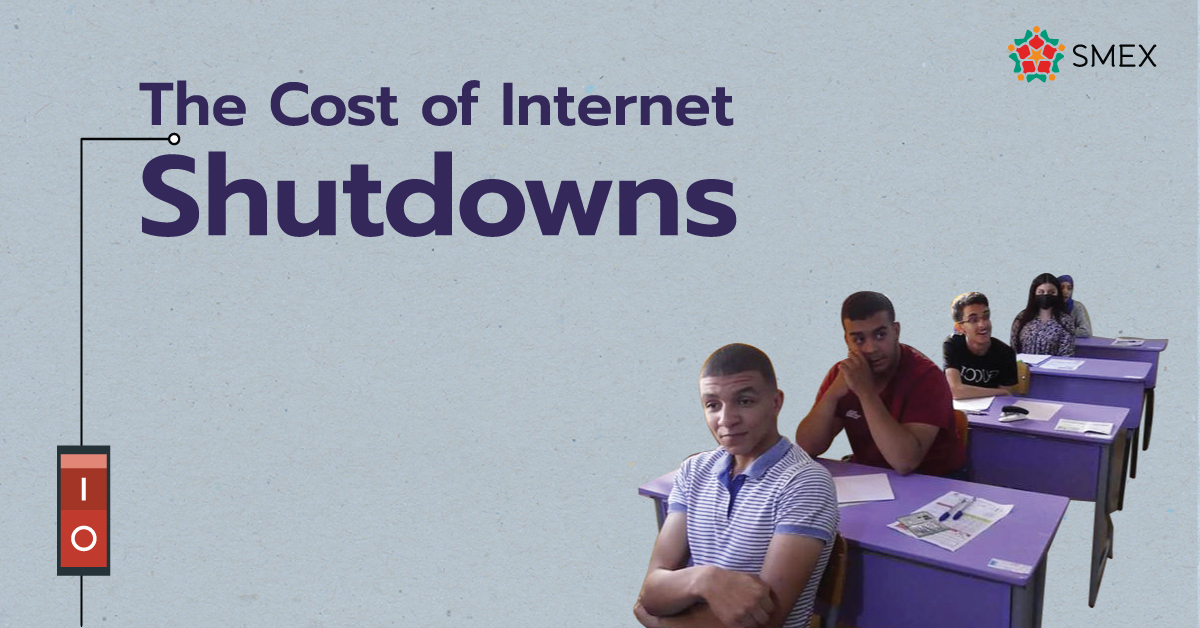This blogpost explains the costs of internet shutdowns during exams in the Arabic-speaking region. It is part of a SMEX campaign on the harms of this practice on the internet, economy and people’s lives.
Internet shutdowns happen when an entity, such as a government or a non-state actor, intentionally disrupts the functioning of the internet. The size and the impact of a shutdown is defined by its location and by the services that are affected. In the Arab region, since the 2011 protests in Egypt, internet shutdowns have become a common event.
Since Iraq and Syria shut down the internet during exams in 2015, more Arab states started to implement this practice to control information leaks and prevent cheating. In 2022, Algeria, Sudan, Jordan and Syria continued this practice. These measures, which are largely ineffective, are causing great economic damage and slowing digital development.
In 2016, the digital economy alone amounted to 15.5% of global GDP; by 2025 it is expected to even reach 24.3%. The internet has increasingly become essential for innovation, development and economic growth. Just like a modern business needs electricity, the digital economy relies on uninterrupted connectivity. An unreliable internet connection lowers economic activity and discourages innovation and investments, damaging states’ economies.
In Algeria, Sudan, Jordan and Syria, which all used internet shutdowns during exams in 2021, the impact of this practice has been significant. In Algeria, for example, the widespread temporary shutdowns during the 2020 Baccalaureate exams caused an estimated 388 million USD damage to the national economy, according to one expert. In Sudan, where the digital infrastructure is largely underdeveloped, exam-related shutdowns in 2020 cost around 5.7 million dollars a day, for a total of more than 68 million dollars for the exam period.
In Jordan, shutdowns are theoretically limited to messaging apps and to areas where exams were taking place. Still, banks and companies reported interrupted service as well: in 2020, the total cost of the shutdown amounted to about 4.9 million dollars. While it is harder to have exact numbers for Syria, keeping the internet on and functioning properly is particularly vital for the economy, already very fragile and weakened by the ongoing conflict.
As seen, the immediate economic impact of shutdowns is significant, especially for countries betting on digital technology for economic growth and development. What these numbers do not show, however, is the long-term effect of this practice. Interestingly, Algeria, Sudan and Jordan all have plans to develop their digital economy, while still implementing shutdowns: these plans and practices are clearly not compatible. An open, secure and trustworthy internet connection is the most fundamental requirement for a successful digital development.
If citizens, businesses and potential investors cannot count on their digital operations working smoothly, they won’t be able to fully access the potential that the digital sphere offers. The consequences are difficulties for students, risks of missing out on global trends, disruption of everyday life and a slowing down of social, economic and digital development. As long as these countries implement internet shutdowns, their digital development will be severely slowed down.
It is clear that internet shutdowns, in this case for trivial reasons like the prevention of cheating, have a massive impact on the economy and on development. In the immediate short-term, they slow down economic activity and disrupt everyday life, causing disproportionately high costs. In the medium- to long-term, then, shutdowns severely boycott development plans, as they can only work with an open, secure and reliable internet.
Below is a table outlining the schedule of internet shutdowns in a number of Arabic-speaking countries where the practice has been recurrent.
If you have any stories about the impact of #Internet_Shutdowns in your country, please share them using this form: https://nafyxzta.paperform.co/
|
Country |
Exam |
Starts on |
Ends on |
Situation |
|
Syria |
Brevet |
May 29, 2022 |
Jun 15, 2022 |
Internet shutdown from 5 to 8 am, according to the MoT. |
|
Baccalaureate |
May 29, 2022 |
Jun 19, 2022 |
||
|
Iraq |
High School Diploma |
May 29, 2022 |
Jun 16, 2022 |
The Minister of Telecom promised that there will be no internet shutdown during exams. |
|
Algeria |
Brevet |
Jun 6, 2022 |
Jun 8, 2022 |
The Internet will be cut off and severe security measures will be implemented. Students who cheat face up to 10 year sentences. Internet shutdown on mobile internet networks. Access to Facebook was disabled during exam hours “to prevent questions from being leaked or used in cheating attempts.” |
|
Baccalaureate |
Jun 12, 2022 |
Jun 16, 2022 |
||
|
Mauritania |
Baccalaureate |
Jun 13, 2022 |
Jun 16, 2022 |
No info available about 2022. |
|
Sudan |
Baccalaureate |
Jun 11, 2022 |
Jun 22, 2022 |
Plans for Internet shutdown for 3 hours a day, from 8 to 11am. |
|
Jordan |
Baccalaureate |
Jun 3, 2022 |
Jul 25, 2022 |
No info available about 2022. |



